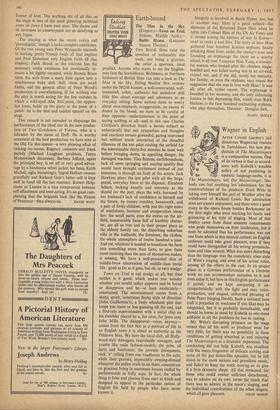Earth-bound
Two British films raise the question of nationality this week, one being a genuine, the other a spurious, local product. Anyone who wants to see the English- ness (not the Scottishness, Welshness, or Northern Irishness) of British films can take a look at The Man in the Sky, Ealing Studios' first venture under the MGM banner, a well-constructed, well- mannered, sober, authentic but somehow dull little film about courage and adventure in an everyday setting. Some nations have to worry about over-emphasis, exaggeration, an excess of drama in the blood; we have to be careful of their opposite—understatement to the point of saying nothing at all—and in this case Charles Crichton's direction treats a heroic subject so unheroically that our sympathies and thoughts and reactions remain grounded, gazing impressed but without much conviction at the dreadful dilemma of the test pilot circling the airfield for the interminable thirty-five minutes he must wait before bringing down, in appalling danger, his damaged machine. This flatness, earthboundness, lack of some springing and soaring quality that would have brought excitement instead of just tenseness, is through no fault of the actors. Jack Hawkins plays the test pilot with all the large, genial, everyday force at his disposal; Elizabeth Sellars, looking exactly and minutely as she should for the part, plays the wife, harassed by her husband's lack of confidence in himself and the future, by money troubles, housework, and a pair of lively children, with just the right notes of wistfulness, humour and exasperation about her; the small parts, even the extras on the air- field, innumerable faces full of knobbly charac- ter, are all as true and in their proper place as the elderly family car, the dispiriting suburban villa in the midlands, the furniture, the clothes, the whole atmosphere of twelve hundred a year. And yet, whatever is needed to transform the facts into something more than facts, to give them more meaning than the sum of themselves makes, is missing. We have a well-presented slice of middle-brow observation of middle-class social life: good as far as it goes, but oh, so very stodgy.
Town on Trial is not stodgy at all, but then neither is it good; which makes you wonder whether you would rather approve and be bored or disapprove and be—at least moderately— entertained. The entertainment comes from a sharp, quick, sometimes flashy style of direction (John Guillermin's), a lively whodunit plot that keeps you more or less guessing till the end, and a first-rate superintendent with a social chip on his shoulder played by a, for once, far fyom cosy John Mills. The disapproval—mine, anyway— comes from the fact that as a portrait of life in an English town it is about as authentic as the Piltdown Man. We have the local club, all Holly- wood-style dowagers, improbable teenagers, and youths like male fashion-models; the pubs, all darts and bonhomie; the juvenile delinquents, rock 'n' rolling from one roadhouse to the next, while their parents, impeccably evening-dressed whenever the police crash in on them, concentrate on gracious living in enormous houses staffed by parlourmaids in frilly caps. In fact, the whole thing is false and phoney from start to finish and designed to appeal to the particular notion of English life held by people who have never known it. Integrity is involved in Battle Hymn, too, but in another way. Here is a good subject—the dilemma of the Reverend Dean Hess when he turns into Colonel Hess of the US Air Force and is loosed among the horrors of war in Korea— used to make a bad film. The story of how Hess gathered four hundred Korean orphans, finally whisking them from under the enemy's nose and founding an orphanage for them on a nearby island, is all true. I suppose Miss Yang, a wonder- ful woman who looked after the children single- handed and was killed saving one in an air-raid, existed too, and if she did, surely her memory, her family, or even the orphans, may resent the suggestion that she was in love with Hess? It was all, after all, rather recent. The orphanage is founded in her memory, and the only redeeming feature in this depressing film, which stars Rock Hudson, is the four hundred enchanting orphans, who play themselves. Director : Douglas Sirk.
ISABEL QUIGLY


































 Previous page
Previous page